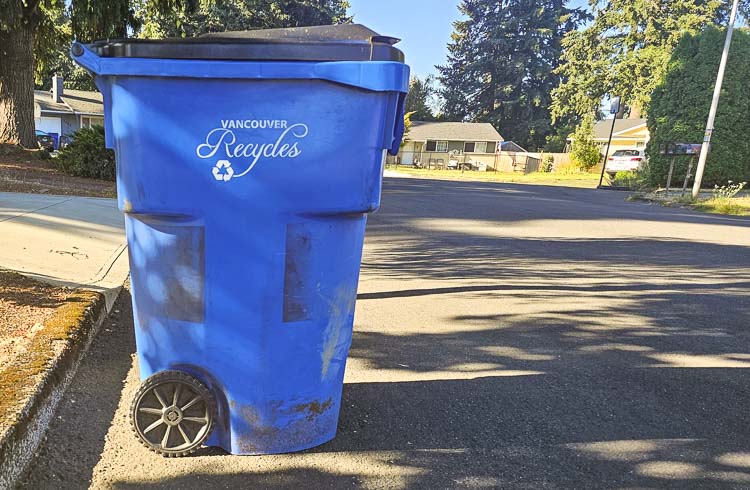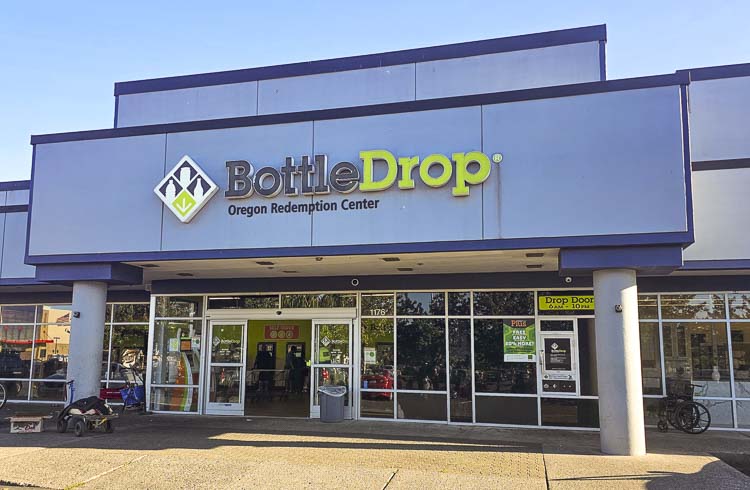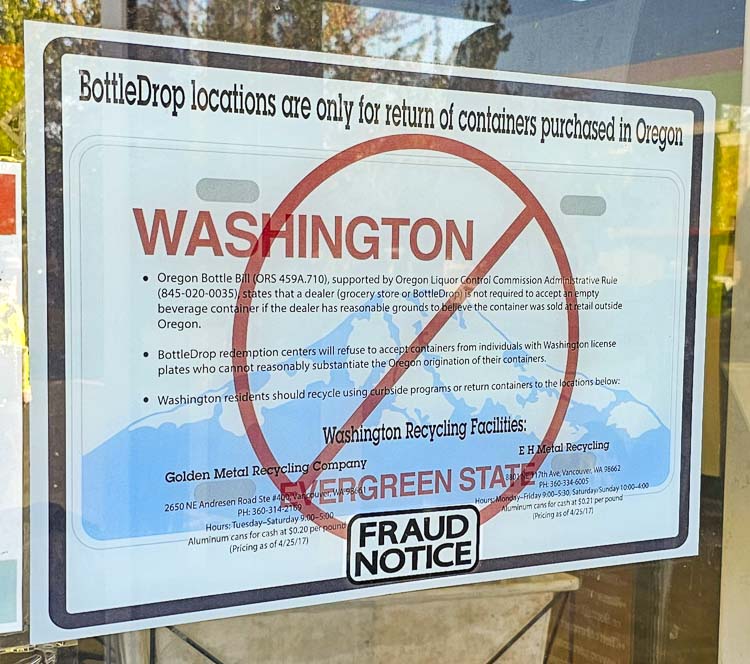
Reporter Paul Valencia and his neighbors have witnessed an increase in the number of people going through their recycling bins, and it can be unnerving when it happens at all hours
Paul Valencia
ClarkCountyToday.com
Is it just a nuisance?
Or is it a crime?
Or is it perfectly OK to go through a stranger’s recycling bin, to collect cans or bottles or whatever else one thinks can be traded in for cash?

Without burying the lede, it is against the law to rummage through another person’s recycling bin. Law enforcement in Clark County says so, and so does Waste Connections, the company that provides recycling services for Clark County residents and businesses.
But, as you can imagine, it is a low-priority crime.
I reached out to Waste Connections and law enforcement officials after what is becoming a frequent, unnerving occurrence where I live in east Vancouver. On Sunday, Aug. 18 through the morning hours of Monday, Aug. 19, we counted five different “teams” of “can collectors” in our neighborhood.
Another term for “can collectors” is thieves.
Talking to others who live in the region, I am convinced there are more and more collectors out there, and they are getting more aggressive in their tactics.
Before hearing from the experts, some background:
About seven or eight years ago, there was an older couple working out of a van that would come to our neighborhood every two weeks on recycling day. The husband-and-wife team actually rang our doorbell, introduced themselves, and asked our permission to take the cans from the recycling bin.
I was not comfortable with the idea, but I was grateful they asked. So I said yes to them. Then I watched them go through the bin. They took stuff out of the bin that they did not want, in order to find more cans at the bottom of the container, then put everything else back in the bin.
It was about as respectful of a criminal act as one could witness.
Of course, at the time, I did not even know it was a crime.
I must say, I really wish we could go back to that time, and that couple.
Nobody asks anymore.
And they come at all hours.
Last year, one “can collector” was using a flashlight in our neighborhood. The flashlight beamed into our daughter’s room. At 2 in the morning, she alerted us, worried that someone was in our yard, looking into her room.
Now, I am not a fighting man, nor would I call myself very brave, but being a dad can lead to courage. I went outside to investigate. I saw a few people walking away and heading to a nearby car. I thought they might have been car prowlers. I got in my car, followed, and called 9-1-1. They stopped a few blocks later, and I watched them get out of the car and look into recycling bins. I told the 9-1-1 operator that they were not car prowlers. They were recycling prowlers. And I headed home.
It turned out, my actions weren’t exactly the most intelligent.
That event made me wonder about others. What if the “can collectors” were armed? What if a homeowner is armed? Such a confrontation, over cans? Seems excessive.
Since that night, I have noticed many other collectors. Every two weeks.
Earlier this month, we saw five teams in an 18-hour stretch.
I was bringing home lunch at 1 p.m. when I saw the first team. This was on a Sunday, the day before recycling was to be picked up in our location, but a few neighbors had already placed their bins on the side of the road. This 1 p.m. team wanted to get the first pickings, I guess.
(That’s another thing. Many no longer wait until night time. They just do it whenever it suits them best.)
Later in the evening, my wife and I went for a walk. We saw another team. On the way home from that same walk, around 8 p.m., we saw a different team — a man slowly driving a truck, a woman walking alongside the truck, opening each lid to see what was inside.
At 11:30 p.m., I took our bin to the curb, and there was someone going through my neighbor’s bin across the street.
And at 7 a.m. the next morning as my wife was heading to work, yes, another team of collectors.
“We deal with it on a daily basis,” said Derek Ranta, district manager of Waste Connections in Clark County. “I’m not a lawyer. I’m not a prosecutor. I don’t have all the rules and regulations on possession.”
But, he said, when a customer puts material on the curb in an official recycling container to be picked up by Waste Connections, it is considered by Waste Connections to be the possession of Waste Connections.
He said those taking cans out of those bins, or any items, are thieves.
With that said, Waste Connections does not encourage its employees to stop such actions. That is not their job, and it can lead to confrontation. Instead, if thieves are caught by law enforcement, Waste Connections, Ranta said, would press charges and support prosecution.
Sgt. Christopher Skidmore, the public information officer for the Clark County Sheriff’s Office, said there have been 228 calls since Jan. 1 regarding this crime in the county’s jurisdiction alone. He assumed the number would be much higher in Vancouver.
Kathy McNicholas, the acting commander for Vancouver Police, did not have specific numbers but agreed that the number is likely much higher in the city than in the county.
They both note that this specific crime seems to be on the rise.

Ranta said more people have been going through recycling containers after Oregon increased its payout to 10 cents a can from 5 cents a can back in 2017. The Bottle Drop Redemption Center near Delta Park in Portland, just across the border, often has a long line of people. Law enforcement and recycling officials say that a good deal of those in that line are taking cans collected in Washington.
Signs at the center say that cans and bottles purchased in Washington are not welcome there, but it is very difficult to enforce, or prove.

As far as the actions in the middle of the night, or even in daytime, at curbside recycling bins in Clark County, Skidmore again noted it is a crime. Not exactly a high priority crime, but a crime nonetheless. If a deputy is available when a call comes in, the deputy would be dispatched to an area.
“The vast majority of the time, by the time we came into an area, they had already moved on,” Skidmore said.
And in the times deputies have made contact with individuals, it is usually about education first.
“Just so you know, this is considered a crime. You can’t be doing this,” they are told.
They move along, Skidmore said, but being realistic, they might not be moving along for long. They might head to the next neighborhood or be back in two weeks.
In most cases, this crime does not fall under the criteria of taking a suspect to jail. If the discussion goes beyond education, a citation might be issued and the person would have to go to court.
“It is low priority,” McNicholas said.
But, she noted, if Vancouver officers are available, they would respond.
“If it is active and in progress, we would come out,” she said.
She also has advice to customers of Waste Connections, people like me.
“You want to be careful. Just call it in. You probably shouldn’t confront them,” McNicholas said. “Nowadays you don’t know who may be armed or have a different intent.”
Skidmore agreed.
“We don’t encourage people to confront people. That’s going to create some kind of conflict,” he said.
After all, 9-1-1 is available 24 hours a day. Operators and law enforcement would still have to prioritize calls but it is worth a shot.
McNicholas and Skidmore also have advice for those who do not want their cans to be stolen. If you have the time, put out the recycling bin closer to the time of pick-up, to give thieves a smaller window of opportunity.
They both understand that is not practical for many people. But for those who can wait, it is an option.
Skidmore noted, anecdotally and from personal experience, that it seems to be working in his neighborhood.
“I wait until the morning until I put out the recycling,” he said, noting that he was speaking on behalf of himself, not the sheriff’s office. “I told my neighbors the same thing. We haven’t seen nearly the amount of people.”
It turns out, having items taken from recycling bins is more than a nuisance. It is a crime.
For me, even though I now know it is a crime, I doubt I’ll be calling 9-1-1 on a can thief.
But I’ll respect any of my neighbors who chose to call law enforcement. Seeing strangers go through the neighborhood’s recycling bins can be unnerving.
My real hope is that confrontation is avoided. If you see recycling thieves and they are doing something that makes you feel uncomfortable, call 9-1-1 and let trained officers respond.
Note: Paul Valencia is a reporter for Clark County Today. He has lived in east Vancouver with his family since 2001.
Also read:
- Letter: ‘Something is wrong when our vote means nothing’Bob Zak challenges the political handling of the I-5 Bridge project and urges voters to demand accountability.
- Letter: ‘This is a time for bold leadership, clear advocacy, and strong representation’Justin Forsman of Vancouver announces his candidacy for mayor and outlines a bold new platform focused on rights, infrastructure, and local governance.
- Opinion: Schools notifying parents about the kinds of care kids can decide on their own didn’t make itElizabeth New criticizes the removal of Amendment 1164 from current legislation, arguing it leaves parents uninformed about health care services accessed by their children through schools.
- Opinion: Off-road vehicles in the neighborhoodDoug Dahl responds to a resident’s concern about off-road vehicles on neighborhood streets, outlining the legal violations and safety risks involved.
- POLL: Is America more united or more divided than it was a decade ago?Clark County Today’s weekly poll asks: Is America more united or more divided today? The question comes after Stephen Davis brought a powerful message to Vancouver.











I am no legal scholar. However, it is my impression that once placed at a public curbside, one’s trash is considered discarded and one relinquishes ownership. It IS a fact that police do not need a search warrant to go thru one’s curbside trash.
Now, I am very confident that, when asked, Waste Connections will undoubtedly say the trash belongs to them. Especially since they can recycle what’s in the bins and generate revenue from the refuse. So, sure, they will say it belongs to them… much like the fox guarding the henhouse.
So if the trash really does belong to Waste Connections, then why are police not required to serve a warrant on Waste Connections to go through the trash? Because once placed at a public curbside, one’s trash is considered discarded and one relinquishes ownership.
It is absolutely KNOWN FOR A FACT that I have much bigger fish to fry and don’t really give a rodent’s rear about who plays in my curbside trash as long as they don’t make a mess. I also suspect that it must really be a slow news day when Paul Valencia writes about curbside dumpster-diving as an opinion piece.
Really? Curbside trash? When there are so, so many other pressing matters of far more importance?
Oregon created a market for this.
Put returnables in a seperate bag
We live in Camas. I don’t really care if they take my recycling, but one time they took the bin with the glass making it necessary to request a new bin. Previously, people had dug through and took the glass they wanted, which can be a bit noisy and noticeable. I guess that’s why someone decided to take the whole bin. Now, we wait until morning to put the glass bin out.
I live in Bagley Downs. And I have been burglarized at least 4 times since I have lived here. I believe when they come down into my cul- de -sac to dig through my Bin, they’re not just grabbing Cans and Bottles, they are casing the place out to see what else they can steal.
I chase them out when I see them. “No trespassing signs” are clearly posted. I can be rather intimidating though…I am not without empathy; However-I am mindful on what needs to be done, and I am not going to be a pushover.
Last year a migrant was in my back yard. I spooked him so bad he got down on his knees with his hands in the air when I came busting out the back door. I gave him 5 dollars and a piece of fruit and told him to leave…now.
Despite living in a gated community, we do experience people crawling under the gates with garbage bags and going from recycle can to recycle can throughout the small community. It is disconcerting for some of my neighbors, especially those who believe that gates will prevent crime (merely a deterrent in reality), but it doesn’t bother me as much as mail thefts.
One thing I do urge others to do is to somehow remove or cover with ink your address labels on recycled items (like cardboard boxes) to keep people from easily accessing information on who you are and where you live. They can get it from a myriad of other sources, but I won’t make it easy for those who might take it from my recycle bin.